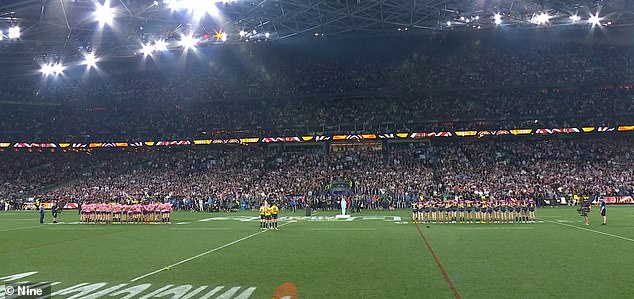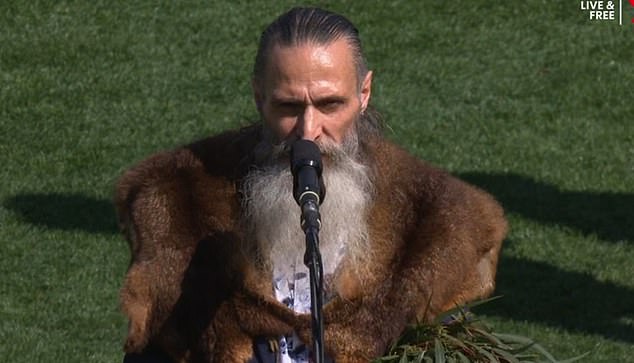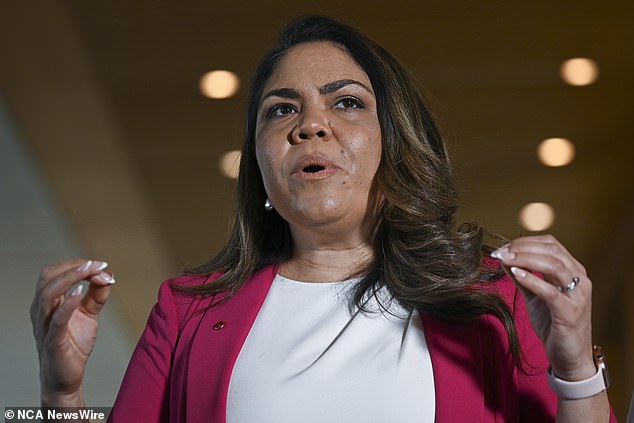Footy fans slam Welcome to Country at NRL Grand Final 2024, accusing Indigenous Elder of being ‘white’
- Welcome to Country has been a divisive topic in recent months
- Received criticism during the AFL final
- Opponents have criticized the Elder who performed the ceremony at the NRL decider
Footy fans have accused an Aboriginal Elder of being ‘white’ in a series of vicious online attacks after she performed the Welcome to Country ceremony at the 2024 NRL Grand Final.
Indigenous elder Aunt Julie Jones and proud Dharug woman performed the ceremony.
“I would like to pay my respects to my ancestors and elders and extend that respect to everyone here tonight,” she said.
“This is our traditional land. Traditional land of the grandparents and ancestors of our mothers, fathers who have walked, sung and danced this land since the beginning of our time here.
“Thank you for walking with us and strengthening the spirit of the country. On behalf of the Spirit of the land.
“On behalf of the Wangal people and the wider Dharug community, thank you for bringing the spirit and stories of your hearts and anchoring them here in this beautiful land. We are so honored to share with everyone who calls her home.
Thank you. Welcome. Have a great night.’
The audience gave the ceremony polite applause and there were positive comments online.
“Well, that was one of the better welcomes to the country I’ve heard,” said one footy fan.
“Nice welcome to the country for the grand final,” another added.
Aunt Julie Jones delivered the Welcome to Country at the 2024 NRL Grand Final

The large crowd cheered the ceremony but criticized Aunt Julie on social media
But many others disapproved of the ceremony and accused the native elder of being “white.”
‘Here’s Aboriginal “Aunt Julie” doing Welcome to Country at the NRL Grand Final. Pretty white for an Aboriginal. How much did she pay for this farce?’ one fan asked.
‘Blonde, white person giving a welcome to the country. Jokes over, can we move on from this?’ asked another.
“Welcome to Country from the whitest person in the stadium,” another fan posted:
‘These white scammers are becoming a joke! Have a real First Nation person do Welcome to Country,” added another.
Welcome to Country has become a divisive issue in recent years, with a ceremony at the recent AFL finals sparking backlash.
Brendan Kerin, the cultural educator at Sydney’s Metropolitan Local Aboriginal Land Council, was criticized after he said the ceremonies were “not for white people”.
It quickly became one of the top trending topics on social media as Australians expressed their disapproval of Kerin’s comments.
There was further criticism during the AFL Grand Final, despite a relatively good-natured speech from Uncle Colin Hunter in the decider between the Sydney Swans and Brisbane Lions.
His ceremony drew huge applause, but there were also boos at the MCG.
“Performing a welcome speech to the country during the AFL #gfinal is exactly how you further divide Australians at an event that should bring people together,” said one viewer.
It’s an issue that has spread beyond sport, with Channel Nine’s Married At First Sight star Dean Wells recently taking exception to a Welcome to Country speech at the end of a Jetstar domestic flight.
“I don’t need to be ‘welcome’ in my own country,” he said angrily.

Uncle Colin Hunter gave a measured Welcome to Country at the AFL Grand Final, but still drew cheers and online criticism

Senator Jacinta Nampijinpa Price says Australia has become saturated with Welcome to Country ceremonies
Another Australian said they were shocked that a Welcome to Country ceremony had been booked ahead of their pilates class.
“I’m all for Welcome to Country,” she said.
“But I think you’re welcome if you have the same people in class every day.”
It has led many to wonder whether Welcome to Country ceremonies are being overused.
Indigenous senator Jacinta Nampijinpa Price said Australia had become “saturated” with it, “removing the sanctity of certain traditional cultures and practices.”
“It’s almost become a throwaway line. We don’t want to see all these symbolic gestures. We want to see real action,” she said.
